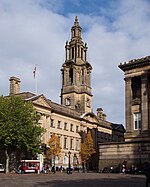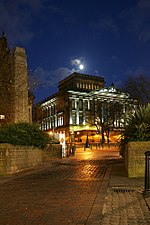Preston Crown Court
Buildings and structures in PrestonCourt buildings in EnglandCrown Court buildingsGovernment buildings completed in 1996

Preston Crown Court, or more properly the Crown Court at Preston, is a criminal court on the Ring Way in Preston, Lancashire, England. The court is based on two sites in the city; Preston Combined Court Centre on Ringway and Sessions House on Lancaster Road. As a first tier court centre, the court deals with all types of cases that are heard in the Crown Court as well as being a trial centre for civil High Court cases; it is also a venue for the County Court where smaller civil cases and family cases are dealt with.
Excerpt from the Wikipedia article Preston Crown Court (License: CC BY-SA 3.0, Authors, Images).Preston Crown Court
Ring Way, Preston Avenham
Geographical coordinates (GPS) Address External links Nearby Places Show on map
Geographical coordinates (GPS)
| Latitude | Longitude |
|---|---|
| N 53.7624 ° | E -2.6989 ° |
Address
Preston Combined Court Centre
Ring Way
PR1 2LL Preston, Avenham
England, United Kingdom
Open on Google Maps










